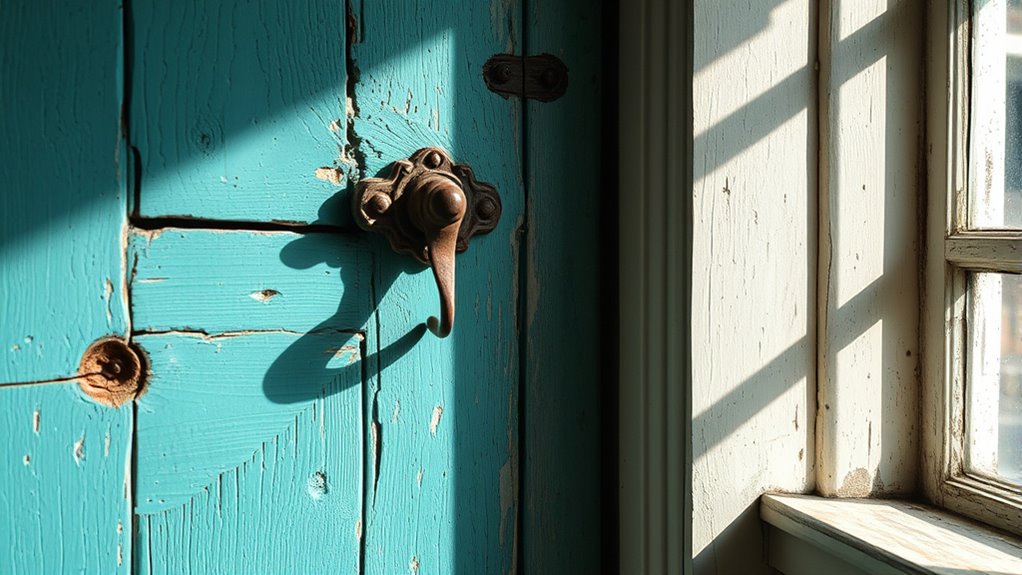Finding beauty in imperfection involves shifting your perspective to embrace flaws as natural and authentic. Instead of endeavoring for flawlessness, appreciate the unique character and stories that imperfections tell. Recognize that cracks, unevenness, and aging symbolize real, raw beauty and life’s transience. By accepting change and decay, you foster patience and self-compassion. Embracing imperfections deepens your connection to yourself and the world around you—discover more ways to see beauty where least expected.
Key Takeaways
- Embrace flaws as natural, authentic expressions that tell unique stories and add character to objects and ourselves.
- Shift focus from perfection to appreciating subtle, overlooked details that reveal inherent beauty.
- Recognize imperfections as symbols of life’s natural cycle, growth, and the passage of time.
- Practice self-compassion by accepting personal flaws as part of your authentic identity.
- Cultivate mindfulness and patience to find serenity and meaning in life’s imperfect, transient moments.

Have you ever noticed how imperfections can make something truly mesmerizing? It’s a perspective that challenges the way you usually see beauty—often associated with flawlessness and perfection. Instead, the Wabi Sabi philosophy invites you to embrace imperfections as a natural part of life. It’s about recognizing that beauty isn’t found in symmetry or flawlessness but in the subtle, often overlooked details that tell a story. When you start to embrace flaws, you shift your focus from chasing perfection to appreciating the unique character each imperfection brings. This mindset allows you to see beauty where others might only see flaws, transforming your perspective on art, objects, and even yourself.
Imperfections reveal beauty and tell stories that perfection often overlooks.
In practicing Wabi Sabi, you learn to accept the transient and imperfect nature of everything around you. Instead of striving for perpetual perfection, you begin to see the charm in things that are aged, cracked, or uneven. These imperfections aren’t signs of neglect or failure but symbols of authenticity and life’s natural cycle. When you embrace flaws, you stop resisting change and decay, understanding that they’re integral to growth and beauty. This shift in attitude encourages patience and mindfulness, helping you appreciate the present moment rather than constantly fixating on an ideal that’s impossible to attain. As you do, you’ll notice a deeper connection to your surroundings, finding serenity in the imperfect and incomplete. Additionally, cultivating creative practice by engaging with imperfections can deepen your appreciation for the beauty found in the irregular and unconventional.
Adopting the Wabi Sabi philosophy also means seeing the beauty in your own imperfections. It’s about accepting your flaws—whether they’re physical, emotional, or behavioral—and realizing that they make you uniquely you. Instead of criticizing yourself for not being perfect, you start to understand that your imperfections are part of your story. They add depth and character, and embracing them allows you to develop a healthier self-image. This attitude fosters self-compassion and patience, helping you to be more forgiving of your mistakes and less obsessed with perfection. In turn, you grow more comfortable with vulnerability and authenticity, which are vital for genuine relationships and personal growth.
Ultimately, embracing flaws through the lens of Wabi Sabi transforms your perception of beauty. It frees you from the endless pursuit of flawlessness and invites you to find meaning and grace in the imperfect. You realize that beauty isn’t about perfection but about authenticity, character, and the stories that imperfections tell. When you adopt this philosophy, you begin to see the world—yourself included—in a new, more compassionate light. Imperfections become not obstacles but opportunities to appreciate life’s fleeting, imperfect, yet profoundly beautiful nature.
Frequently Asked Questions
How Can Embracing Imperfection Boost Self-Confidence?
Embracing imperfection boosts your self-confidence by fostering self-acceptance and authenticity. When you accept your flaws, you stop comparing yourself to others and start appreciating your unique qualities. This honesty builds trust within yourself, making you more comfortable and genuine in your actions. As a result, you project confidence and attract positive connections. Remember, embracing imperfections isn’t about perfection but about celebrating your true, authentic self.
What Are Common Fears About Accepting Flaws?
Are you worried that accepting your flaws might lead to judgment from others? You probably fear self acceptance challenges and that your imperfections will make you less valued or loved. This fear of judgment often holds you back from embracing yourself fully. But remember, everyone has flaws, and accepting them is a powerful step toward genuine confidence. Can you imagine how freeing it would be to simply be yourself without fear?
How Does Imperfection Influence Creativity and Innovation?
Imperfection sparks creativity and innovation by revealing the beauty of flaws, encouraging you to think outside the box. When you embrace imperfections, you gain creative freedom to experiment and take risks without fear of perfection. This mindset allows you to develop unique ideas and solutions, making your work authentic and compelling. Recognizing the beauty of flaws helps you see potential where others see only shortcomings, fueling continuous growth and inventive breakthroughs.
Can Embracing Imperfection Improve Relationships?
Yes, embracing imperfection can improve your relationships by helping you move past unrealistic beauty standards and perfectionism pitfalls. When you accept flaws in yourself and others, you foster honesty, vulnerability, and genuine connection. This openness encourages trust and understanding, making interactions more authentic. By valuing imperfect qualities, you create a supportive environment where love and empathy thrive, ultimately strengthening your bonds and enriching your relationships.
What Cultural Differences Exist in Perceiving Imperfection?
Cultural differences deeply influence how you perceive imperfection. In some societies, strict beauty standards push perfectionism, dismissing authenticity. Conversely, other cultures celebrate genuine flaws, embracing imperfections as part of true beauty. You might find that Western cultures often prize polished perfection, while Eastern cultures value authenticity and naturalness. Recognizing these diverse perceptions helps you appreciate that imperfections aren’t universally frowned upon but culturally celebrated or subtly suppressed.
Conclusion
Remember, beauty truly lies in the eye of the beholder. When you embrace imperfections, you discover a unique charm that makes everything more authentic and memorable. Don’t shy away from flaws—instead, see them as opportunities for growth and individuality. As the saying goes, “Perfection is the enemy of good.” By appreciating imperfections, you reveal a deeper appreciation for life’s genuine, imperfect moments. Embrace them, and you’ll find beauty in every detail.









